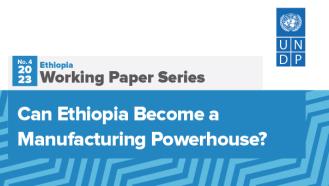Second Annual Development Conference
Can Ethiopia become a manufacturing powerhouse?
December 8, 2023
Addis Ababa, 8 December 2023 - UNDP’s 2023 Annual Development Conference explored Ethiopia’s likelihood of transitioning from trading to manufacturing, and showcased UNDP’s latest working paper which proposed reforms that could help the country fulfil its ambitions of becoming a manufacturing powerhouse.
Organised to tackle the theme Can Ethiopia become a manufacturing powerhouse? the Annual Development Conference showcased analytics and findings published in the latest UNDP working paper, and participants also had the opportunity to hear global lessons shared by keynote speakers from Bangladesh and Kenya.
"The manufacturing sector is linked to a country’s commitment to deliver across the various Sustainable Development Goals," Ms. Charu Bist, UNDP Ethiopia's acting Resident Representative, underlined at the opening of the Annual Development Conference, while raising concerns that when it comes to commitments to gender equality, the focus on job creation, especially for women, must go beyond numbers and ensure 'decent jobs'.
UNDP's working paper on the manufacturing sector included surveys to micro, small medium and large enterprises sent out with the support of the Addis Chamber of Commerce. UNDP Ethiopia’s Policy Development and Research Hub also held field visits and interviews with both public and private sector officials.
According to the working paper's findings, Ethiopia has considerable potential to become a manufacturing power, export USD 10 billion by 2030, and create many thousands of jobs. Despite repeated interventions to support manufacturing, the sector remains nascent. The exports remain anchored on coffee, horticulture, and oilseeds. The introduction of industrial parks in 2015 has been promising but adversely impacted by shocks. The analysis highlights three trends facing the manufacturing sector:
The share of manufacturing as a percent of GDP has declined from 5.9 percent in 2019 to 4.4 percent in 2022, in part due to the combined domestic and exogenous shocks, with, according to the Ministry of Industry 446 firms closing in 2022. Investors have been leaving the industrial parks.
Despite policy interventions, there has been limited product diversification and a lack of export complexity, with 50 percent of the total production focused on food products, beverages, non-metallic minerals, and textile/apparel.
The study found that there are more than 20 conglomerates that are family-run sit at the apex of the industrial system and span multiple sectors, with most of them private. The large and medium firms are 75 percent value-added but have not had sufficient employment creation in recent years, and there has been limited graduation of small and medium firms to the larger size.
The study reflected that Ethiopia’s economic policy framework still favoured importers and traders, with the gap between imports and exports reaching USD 14 billion in 2022 and USD 13.5 billion in 2023. Those engaged in light manufacturing were also noted to serve domestic markets, with little traction made in the creation of exports and quality jobs.
While the working paper concluded on a high note that ‘Ethiopia has significant potential to overcome recent shocks and reach a strong growth trajectory in the medium term’, the report stressed that the country faced the challenge of overcoming the trifecta of macroeconomic pressures, and security challenges of exogenous shocks. In particular, foreign exchange shortage, limited access to finance, costly logistics, skills mismatch, and challenges in land access.
Recommendations included the importance for Ethiopia to improve macroeconomic stability, security, policy consistency, and sector-specific policies. The working paper also emphasised the importance of invigorating the public-private dialogue, deepening the country’s economic growth and development, leading to structural change, and creating quality jobs.
The Annual Development Conference was launched by UNDP in 2022 to provoke thought and dialogue on key issues of development relevance for Ethiopia and showcase UNDP’s latest analytical works.
About UNDP
UNDP is the leading United Nations organization fighting to end the injustice of poverty, inequality, and climate change. Working with our broad network of experts and partners in 170 countries and territories, we help nations build integrated, lasting solutions for people and the planet.

 Locations
Locations
